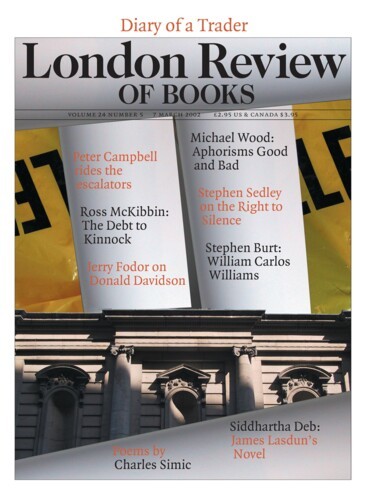As we go to press at the beginning of the last quarter of February, the phoney spring is over. Mid-January to mid-February was the warmest it’s been since 1659 (which is when records began), foxing unwary plants into flowering prematurely, to give the frost something to kill. My feelings about the weather are not put into any kind of perspective by the stoicism of Mark Blumberg, a psychologist at the University of Iowa, who says in his new book, Body Heat: Temperature and Life on Earth (due from Harvard in May), that ‘Pluto is cold; Chicago in January is merely inconvenient.’ For those of us still languishing in the dark ages of terrestrial analogue TV, the gloom is deepened by the fog that currently envelops BBC2’s schedules: the Winter Olympics. The last three episodes of season five of Buffy the Vampire Slayer have been postponed until the fog disperses. Buffy is routinely displaced by what passes for sport on the BBC these days: now it’s the Olympics, which even the Duke of Edinburgh has given up pretending to be interested in; in the autumn it was the snooker. On Sky, by contrast, not only is there plenty of proper sport, but Buffy season six is well under uninterrupted way, as is the nth season of The Simpsons, the other best thing on TV, which BBC2 has just lost to Channel 4. (It should not go unremarked that Buffy and The Simpsons are both owned by Twentieth Century Fox; Fox, like Sky, is a subsidiary of Rupert Murdoch’s News Corp. Channel 4 is said to have paid £15 million per series – £700,000 per episode – in the Simpsons deal. Murdoch’s British enterprises continue to enjoy generous tax breaks.)
Buffy Summers is a Southern Californian teenager – blonde, 5'3" – with special powers (superhuman strength etc) that enable her to slay vampires with relative ease. Joss Whedon, the show’s creator, came up with the idea because he was tired of seeing small, blonde Californian teenage girls being on-screen victims. Buffy is helped by a bunch of goofy friends, prominent among them Rupert Giles, the school librarian (played by Anthony Stewart Head, whose career, before Buffy, had peaked with those Nescafé Gold Blend ads), and Angel, a vampire cursed with a soul, who now has his own spin-off series. It sounds fairly crappy. People who’ve never seen it tend to think it’s crappy. But they haven’t seen it. It’s very funny, very clever (and fairly intelligent, too), engrossing, even at times quite affecting. It has a large and not too narrow fan base; at least one serious English novelist is rumoured to have stayed at home to watch it rather than go to the TLS centenary party. PhDs are being written on it. Reading the Vampire Slayer: An Unofficial Critical Companion to ‘Buffy’ and ‘Angel’, edited by Roz Kaveney (Tauris, £12.99), has contributions from a variety of academics and journalists, and for the most part it makes good reading, despite the odd dud note: ‘Buffy’s breezy versatility with a full spectrum of comedy would alone earn its place in the annals of jocosity’ – true enough, perhaps, but the sentence doesn’t exactly show what it tells.
In Buffy, the supernatural is both entirely literal and entirely figurative. The Mayor of Sunnydale, Richard P. Wilkins III – folksy, hygiene-obsessed, the kind of person you’d expect to find on the Christian Right – turns out, unsurprisingly, to be in league with the dark powers. Part of the fun comes from the apparent disparity between Buffy the Vampire Slayer and Buffy the Valley Schoolgirl. But the demons are also object correlatives for the characters’ emotions – emotions that could seem all too trivial to a detached observer. When Angel goes bad after having sex with Buffy, it really is nearly the end of the world. If we lived in Buffyland, Rupert Murdoch would be a demon, and it would be his fault that the Winter Olympics are on TV tonight. And the demon directors of Enron would somehow be responsible for the weather.
Send Letters To:
The Editor
London Review of Books,
28 Little Russell Street
London, WC1A 2HN
letters@lrb.co.uk
Please include name, address, and a telephone number.

